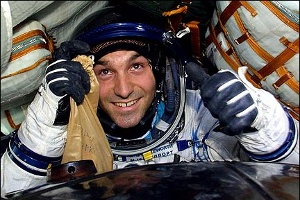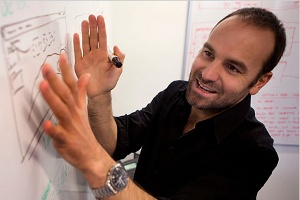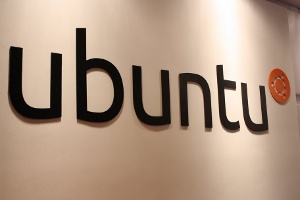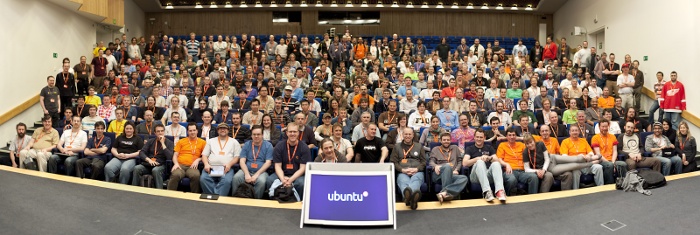Ubuntu history
Ubuntu history begins in April 2004. But before telling about Ubuntu itself, it is worth mentioning some key figures and events that preceded its appearance.
No Ubuntu story can be complete without the story of its founder, Mark Shuttleworth.
 Mark Shuttleworth was born in 1973, in the city of Welkom, Free State Province, South Africa. He attended a reputable Diocesan College and received his doctorate in finance and information systems at Cape Town University. During this period, Mark was passionately passionate about computers and became an active member of the Open Source community. At least indirectly, he participated in Apache and Debian projects, and was the first person to download the Apache web server, probably the most important server application for the GNU / Linux platform, into the archives of the Debian project.
Mark Shuttleworth was born in 1973, in the city of Welkom, Free State Province, South Africa. He attended a reputable Diocesan College and received his doctorate in finance and information systems at Cape Town University. During this period, Mark was passionately passionate about computers and became an active member of the Open Source community. At least indirectly, he participated in Apache and Debian projects, and was the first person to download the Apache web server, probably the most important server application for the GNU / Linux platform, into the archives of the Debian project.
')
Seeing the possibilities and potential of the Internet, Shuttleworth founded a certification authority and an Internet security company in his garage, called Thawte. For several years, he has grown Thawte into the second largest certificate authority on the entire Internet, second only to security whale - Verisign. By the way, Thawte products and services were built and maintained by free software. In December 1999, Shuttleworth sold Thawte to Verisign for an amount that was not disclosed, but which was rumored to be on the order of several hundred million US dollars.
With such a fortune at a young age, Shuttleworth could enjoy a comfortable life. But instead, he decided to realize his cherished dream - to go on a space trip. After paying about $ 20 million to the Russian space program and devoting about a year of preparation, including studying Russian and training at Star City, Shuttleworth realized the dream as a civilian astronaut on board the Russian Union TM-34. Shuttleworth spent 2 days in the Soyuz rocket and 8 days at the International Space Station, where he participated in experiments devoted to the study of AIDS and the genome. In early May 2002, Mark Shuttleworth returned to Earth.
In addition to space exploration and a trip to the Antarctic, Shuttleworth played an active role as a philanthropist and venture capitalist. In 2001, Shuttleworth founded the Shuttleworth Foundation (TSF), a non-profit organization based in South Africa. The Foundation was founded to finance, develop and implement innovations in the field of education. Of course, free software was used as the means by which TSF tried to achieve its goals. As part of these projects, the organization has become one of the most prominent supporters of open source software in South Africa and in the whole world. In the field of venture capital, Shuttleworth supported research, development and entrepreneurship in South Africa with strategic injections of money into start-ups through a new venture capital firm called HBD, which means “Here Be Dragons” (“Dragons”). During this period, Shuttleworth was busy brainstorming for his next major project, which will eventually become Ubuntu.
There was no shortage of projects that tried to combine GNU, Linux, and other pieces of open and free software into a neat, workable, and user-friendly shell. Mark Shuttleworth, like most other people, believed that the philosophical and pragmatic benefits of using free software would determine the course for further success. However, none of the proposals that existed were particularly impressive. Something was missing in each of them. Shuttleworth saw in this perspective.
 Shuttleworth, like many other techies, was a big fan of the Debian project. However, there were many things in Debian that did not coincide with his vision of the ideal OS. For a while, Shuttleworth considered the possibility of becoming the leader of the Debian project for reforming the project from within. A little later, it became clear that the best solution was not to work within the Debian project, which in many situations had good reasons to stay on the path it had developed. Instead, Mark decided to build a new project that would work in symbiosis with Debian to create a new, better GNU / Linux system.
Shuttleworth, like many other techies, was a big fan of the Debian project. However, there were many things in Debian that did not coincide with his vision of the ideal OS. For a while, Shuttleworth considered the possibility of becoming the leader of the Debian project for reforming the project from within. A little later, it became clear that the best solution was not to work within the Debian project, which in many situations had good reasons to stay on the path it had developed. Instead, Mark decided to build a new project that would work in symbiosis with Debian to create a new, better GNU / Linux system.
To start this project, in April 2004, Shuttleworth invited a dozen, or so, Debian developers, whom he knew personally, to his apartment in London. It was at this meeting that the foundation of the Ubuntu project was laid. During the meeting, the team that eventually grew into the core of Ubuntu developers compiled a list of ideas that they would like to see in their ideal OS. Now this list is familiar to most Ubuntu users:
There was a clear understanding in the group that action was more important than words, so there were no public statements or press releases. Instead, the group set a deadline of 6 months. Shuttleworth agreed to finance the work and pay developers full-time. After six months, they will announce the project and provide the first fruits of their work. They also made a list of goals that they would like to achieve on time, and appointed responsible persons.
The Warthogs, as they called themselves, were a great team, had a set of clear goals and ideas on how to achieve most of them. On the other hand, the team did not have a name for its project. Shuttleworth strongly insisted on calling the project "Ubuntu".
 Ubuntu is a concept and term of several South African languages, including Zulu and Spit. The definition of “ubuntu” is difficult to translate into Russian, but in general terms it means “humanity in relation to others” or “I am, because we are”. Some describe ubuntu as "faith in the universal force that binds all of humanity."
Ubuntu is a concept and term of several South African languages, including Zulu and Spit. The definition of “ubuntu” is difficult to translate into Russian, but in general terms it means “humanity in relation to others” or “I am, because we are”. Some describe ubuntu as "faith in the universal force that binds all of humanity."
Ubuntu turned out to be a term that capaciously expressed where the project came from, where it goes and how it plans to do it. The name was perfect and it finally got stuck.
To pay the main developers for working on Ubuntu, Shuttleworth needed to create a company. He wanted to gather some of the best people to work with global opensource communities. These communities have no national or geographical boundaries. Instead of moving each employee to one location or office, Shuttleworth decided to merge them into a “virtual company”. Although such a solution had obvious drawbacks in the form of high latency and low bandwidth connections, different time zones and much more, it also promised benefits in the specific context of the project. The distributed nature of the employees meant that the new company could hire individuals without requiring them to move to a new country. Each company employee could use IRC, mailing lists and various online communications to do their job. In the first year of existence, the most similar to the office was Shuttleworth's private apartment in London.
Over time, the company has grown to be called Canonical. The name was a tribute to optimistic forecasts - to become the canonical site for supporting free software, Ubuntu in particular. And this is also a common word in programmer slang. It is important to note that, unlike a monopoly, being canonical does not mean an exclusive right to anything. Other companies will support Ubuntu and develop operating systems based on it. But while Canonical does a good job, its role will remain central.

Mark Shuttleworth
No Ubuntu story can be complete without the story of its founder, Mark Shuttleworth.
 Mark Shuttleworth was born in 1973, in the city of Welkom, Free State Province, South Africa. He attended a reputable Diocesan College and received his doctorate in finance and information systems at Cape Town University. During this period, Mark was passionately passionate about computers and became an active member of the Open Source community. At least indirectly, he participated in Apache and Debian projects, and was the first person to download the Apache web server, probably the most important server application for the GNU / Linux platform, into the archives of the Debian project.
Mark Shuttleworth was born in 1973, in the city of Welkom, Free State Province, South Africa. He attended a reputable Diocesan College and received his doctorate in finance and information systems at Cape Town University. During this period, Mark was passionately passionate about computers and became an active member of the Open Source community. At least indirectly, he participated in Apache and Debian projects, and was the first person to download the Apache web server, probably the most important server application for the GNU / Linux platform, into the archives of the Debian project.')
Seeing the possibilities and potential of the Internet, Shuttleworth founded a certification authority and an Internet security company in his garage, called Thawte. For several years, he has grown Thawte into the second largest certificate authority on the entire Internet, second only to security whale - Verisign. By the way, Thawte products and services were built and maintained by free software. In December 1999, Shuttleworth sold Thawte to Verisign for an amount that was not disclosed, but which was rumored to be on the order of several hundred million US dollars.
With such a fortune at a young age, Shuttleworth could enjoy a comfortable life. But instead, he decided to realize his cherished dream - to go on a space trip. After paying about $ 20 million to the Russian space program and devoting about a year of preparation, including studying Russian and training at Star City, Shuttleworth realized the dream as a civilian astronaut on board the Russian Union TM-34. Shuttleworth spent 2 days in the Soyuz rocket and 8 days at the International Space Station, where he participated in experiments devoted to the study of AIDS and the genome. In early May 2002, Mark Shuttleworth returned to Earth.
In addition to space exploration and a trip to the Antarctic, Shuttleworth played an active role as a philanthropist and venture capitalist. In 2001, Shuttleworth founded the Shuttleworth Foundation (TSF), a non-profit organization based in South Africa. The Foundation was founded to finance, develop and implement innovations in the field of education. Of course, free software was used as the means by which TSF tried to achieve its goals. As part of these projects, the organization has become one of the most prominent supporters of open source software in South Africa and in the whole world. In the field of venture capital, Shuttleworth supported research, development and entrepreneurship in South Africa with strategic injections of money into start-ups through a new venture capital firm called HBD, which means “Here Be Dragons” (“Dragons”). During this period, Shuttleworth was busy brainstorming for his next major project, which will eventually become Ubuntu.
There was no shortage of projects that tried to combine GNU, Linux, and other pieces of open and free software into a neat, workable, and user-friendly shell. Mark Shuttleworth, like most other people, believed that the philosophical and pragmatic benefits of using free software would determine the course for further success. However, none of the proposals that existed were particularly impressive. Something was missing in each of them. Shuttleworth saw in this perspective.
 Shuttleworth, like many other techies, was a big fan of the Debian project. However, there were many things in Debian that did not coincide with his vision of the ideal OS. For a while, Shuttleworth considered the possibility of becoming the leader of the Debian project for reforming the project from within. A little later, it became clear that the best solution was not to work within the Debian project, which in many situations had good reasons to stay on the path it had developed. Instead, Mark decided to build a new project that would work in symbiosis with Debian to create a new, better GNU / Linux system.
Shuttleworth, like many other techies, was a big fan of the Debian project. However, there were many things in Debian that did not coincide with his vision of the ideal OS. For a while, Shuttleworth considered the possibility of becoming the leader of the Debian project for reforming the project from within. A little later, it became clear that the best solution was not to work within the Debian project, which in many situations had good reasons to stay on the path it had developed. Instead, Mark decided to build a new project that would work in symbiosis with Debian to create a new, better GNU / Linux system.To start this project, in April 2004, Shuttleworth invited a dozen, or so, Debian developers, whom he knew personally, to his apartment in London. It was at this meeting that the foundation of the Ubuntu project was laid. During the meeting, the team that eventually grew into the core of Ubuntu developers compiled a list of ideas that they would like to see in their ideal OS. Now this list is familiar to most Ubuntu users:
- Predictable and frequent release cycles;
- Focus on localization and accessibility;
- Emphasis on ease of use and user friendliness;
- Emphasis on using Python as the only programming language with which the entire system can be built and expanded;
- A community-based approach that has already worked with existing open source projects and the method by which development teams can go back on their work in progress;
- A new set of tools built around the development process of the distribution, which would allow developers to interact with the ecosystem of various projects and that would allow to get the most out of users.
There was a clear understanding in the group that action was more important than words, so there were no public statements or press releases. Instead, the group set a deadline of 6 months. Shuttleworth agreed to finance the work and pay developers full-time. After six months, they will announce the project and provide the first fruits of their work. They also made a list of goals that they would like to achieve on time, and appointed responsible persons.
What does Ubuntu mean?
The Warthogs, as they called themselves, were a great team, had a set of clear goals and ideas on how to achieve most of them. On the other hand, the team did not have a name for its project. Shuttleworth strongly insisted on calling the project "Ubuntu".
 Ubuntu is a concept and term of several South African languages, including Zulu and Spit. The definition of “ubuntu” is difficult to translate into Russian, but in general terms it means “humanity in relation to others” or “I am, because we are”. Some describe ubuntu as "faith in the universal force that binds all of humanity."
Ubuntu is a concept and term of several South African languages, including Zulu and Spit. The definition of “ubuntu” is difficult to translate into Russian, but in general terms it means “humanity in relation to others” or “I am, because we are”. Some describe ubuntu as "faith in the universal force that binds all of humanity."Ubuntu turned out to be a term that capaciously expressed where the project came from, where it goes and how it plans to do it. The name was perfect and it finally got stuck.
Create Canonical
To pay the main developers for working on Ubuntu, Shuttleworth needed to create a company. He wanted to gather some of the best people to work with global opensource communities. These communities have no national or geographical boundaries. Instead of moving each employee to one location or office, Shuttleworth decided to merge them into a “virtual company”. Although such a solution had obvious drawbacks in the form of high latency and low bandwidth connections, different time zones and much more, it also promised benefits in the specific context of the project. The distributed nature of the employees meant that the new company could hire individuals without requiring them to move to a new country. Each company employee could use IRC, mailing lists and various online communications to do their job. In the first year of existence, the most similar to the office was Shuttleworth's private apartment in London.
Over time, the company has grown to be called Canonical. The name was a tribute to optimistic forecasts - to become the canonical site for supporting free software, Ubuntu in particular. And this is also a common word in programmer slang. It is important to note that, unlike a monopoly, being canonical does not mean an exclusive right to anything. Other companies will support Ubuntu and develop operating systems based on it. But while Canonical does a good job, its role will remain central.

Source: https://habr.com/ru/post/106582/
All Articles